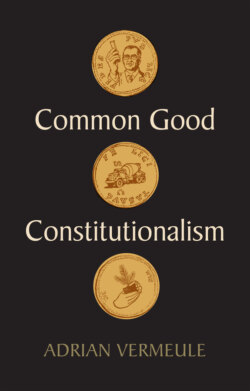Читать книгу Common Good Constitutionalism - Adrian Vermeule - Страница 9
Rational Ordering for the Common Good
ОглавлениеIn the classical tradition, law is seen as – in Aquinas’ famous definition7 – an ordinance of reason for the common good, promulgated by a public authority who has charge of the community. Law is seen as intrinsically reasoned and also purposive, ordered to the common good of the whole polity and that of mankind. Classical law treats enacted texts as products of the reasoned deliberation of public authorities who give specific content to the law where background legal principles need specificity or leave relevant issues to discretionary choice. Where at all possible, classical law reads the law of a particular jurisdiction (the ius civile) in light of the ius gentium (the law of nations or peoples) and the ius naturale (natural law), which the civil positive law is taken to specify or “determine” within reasonable boundaries. General principles of law might, for example, say that, at some point, peace and order require that potential defendants should have repose from the risk of being sued; it would then be up to the civil law in such an instance to determine a specific statute of limitations and to resolve the many questions that flow from it.
Put differently, the classical tradition distinguishes, as many European languages do, between two senses of “law,” lex and ius. (In Spanish, ley and derecho; in French, loi and droit; and so on. English, to its misfortune, has no stable version of this distinction and instead uses “law” and “right(s)” in confusing ways.) Lex is the enacted positive law, such as a statute. Ius is the overall body of law generally, including and subsuming lex but transcending it, and containing general principles of jurisprudence and legal justice. Thus lex is a source of ius but does not exhaust its content. In this tradition, “rights” very much exist, but they are not defined in the essentially individualist, autonomy-based, and libertarian fashion familiar today. Instead “rights” are corollaries of justice, which is the constant aim of giving every man his due. Ius is what is due to every person, and in this sense, but only this sense, includes rights. In the classical tradition, both natural and positive are, in somewhat different ways, themselves included within law’s larger ordering to the common good.
Today both progressives and originalists either deny the existence of the natural law altogether (the usual progressive view), or deny its relevance to law except in strictly historical terms, as a background belief potentially incorporated into the law laid down by the framers and ratifiers (the now-standard originalist view). Both camps therefore attempt, in different ways, to reduce all law to positive law adopted by officials; for them, all law is in this sense lex. But just because ius is lost to view does not mean that it has actually been purged from American law – far from it. The classical vision of law as a rational ordering to the common good, embedded in a broader framework of legal principles, has merely been driven underground. Judges and others unavoidably and unmistakably work with some account or other of the common good and of law’s ordering to that good. We will see this point over and over again, in disparate areas.
